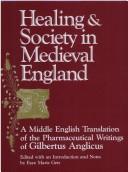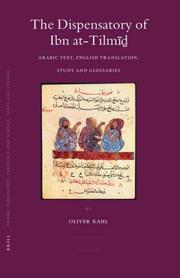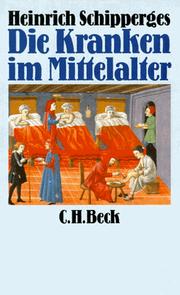| Listing 1 - 10 of 43 | << page >> |
Sort by
|
Book
ISBN: 3110707381 9783110707380 Year: 2020 Publisher: München De Gruyter Oldenbourg
Abstract | Keywords | Export | Availability | Bookmark
 Loading...
Loading...Choose an application
- Reference Manager
- EndNote
- RefWorks (Direct export to RefWorks)
Gestützt auf Tausende von Seiten mit privaten handschriftlichen Aufzeichnungen aus ärztlicher Feder, schildert dieses Buch die theoretische, anatomische und praktische Ausbildung und das gelehrte Selbstverständnis der Renaissance-Ärzte. Es erläutert die uns heute fremd gewordenen, damals aber weithin akzeptierten Vorstellungen von der Natur, Entstehung, Diagnose und Behandlung der wichtigsten, damals verbreitet diagnostizierten Krankheiten und skizziert die Bedeutung neuer Wissensfelder wie der Anatomie und der Frauenheilkunde. Es untersucht die Arzt-Patienten-Beziehung, die Konflikte und die ethischen Herausforderungen. Es wirft ein neues Licht auf das Verhältnis der ärztlichen Medizin zu den Laienheilern und zur "Volksmedizin" und lässt immer wieder die Kranken und ihre Angehörigen selbst zu Wort kommen. So verbindet die Darstellung die umfassende Rekonstruktion der damaligen medizinischen Welt in vielfältigen Facetten mit vielen neuen, detailreichen Einblicken in den heilkundlichen Alltag. Michael Stolberg offers the first comprehensive presentation of medical training and day-to-day medical practice during the Renaissance. Drawing on previously unknown manuscript sources, he describes the prevailing notions of illness in the era, diagnostic and therapeutic procedures, the doctor-patient relationship, and home and lay medicine.
Renaissance medicine. --- academic physicians. --- everyday medical practice. --- lay medicine. --- pathology.
Book
ISBN: 3110733544 311073835X Year: 2021 Publisher: München ; Wien : De Gruyter Oldenbourg,
Abstract | Keywords | Export | Availability | Bookmark
 Loading...
Loading...Choose an application
- Reference Manager
- EndNote
- RefWorks (Direct export to RefWorks)
Michael Stolberg offers the first comprehensive presentation of medical training and day-to-day medical practice during the Renaissance. Drawing on previously unknown manuscript sources, he describes the prevailing notions of illness in the era, diagnostic and therapeutic procedures, the doctor-patient relationship, and home and lay medicine.
HISTORY / Modern / 17th Century. --- Renaissance medicine. --- academic physicians. --- everyday medical practice. --- lay medicine. --- pathology. --- To 1500

ISBN: 0299129349 0299129330 9780299129330 0299129306 9780299129309 9780299129347 Year: 1991 Publisher: Madison, Wis. University of Wisconsin Press
Abstract | Keywords | Export | Availability | Bookmark
 Loading...
Loading...Choose an application
- Reference Manager
- EndNote
- RefWorks (Direct export to RefWorks)
Pharmacy --- History of Medicine, Medieval --- Medicine, Medieval --- History of Medicine, Renaissance --- Medicine, Medieval History --- Medicine, Renaissance --- Medieval History (Medicine) --- Renaissance Medicine --- Medieval History --- Histories, Medieval (Medicine) --- History Medicine, Medieval --- History, Medieval (Medicine) --- Medieval Histories (Medicine) --- Medieval History Medicine --- history --- Gilbertus,
Book
ISBN: 3527177752 Year: 1992 Publisher: Weinheim VCH
Abstract | Keywords | Export | Availability | Bookmark
 Loading...
Loading...Choose an application
- Reference Manager
- EndNote
- RefWorks (Direct export to RefWorks)
History, Medieval. --- Medicine in Literature. --- Science in Literature --- Literature, Medicine in --- Literature, Science in --- in Literature, Medicine --- in Literature, Science --- Literature --- History of Medicine, Medieval --- History of Medicine, Renaissance --- Medicine, Medieval History --- Medicine, Renaissance --- Medieval History (Medicine) --- Renaissance Medicine --- Medieval History --- Histories, Medieval (Medicine) --- History Medicine, Medieval --- History, Medieval (Medicine) --- Medieval Histories (Medicine) --- Medieval History Medicine --- Italy. --- Sardinia --- History, Medieval --- Medicine in Literature
Book
ISBN: 1282602527 9786612602528 9047424506 9789004171190 9789047424505 9781282602526 9004171193 Year: 2009 Publisher: Leiden Boston Brill
Abstract | Keywords | Export | Availability | Bookmark
 Loading...
Loading...Choose an application
- Reference Manager
- EndNote
- RefWorks (Direct export to RefWorks)
The development of medical drug therapy in medieval times can be seen as an interplay between tradition and innovation. This book follows the changes in the therapy from the Arabic medicine of Ibn Sīnā (Avicenna) to Latin medical scholasticism, aiming to trace both the continuity and the development in the theory and practice of medieval drug therapy. In this delicate balance between change and continuity a crucial role was played by the scientific community through critical rejection or acceptance of new ideas. The drug choices were in most cases rational also from the point of view of contemporary medical theory. The method used in the book for studying these choices could promote the development of a novel methodology for historical ethnopharmacology.
Pharmacology --- Medicine, Medieval. --- Pharmacopoeias. --- History. --- Medicine, Medieval --- Medieval medicine --- Pharmacy --- Dispensatories --- Medicine --- Drug Therapy --- History, Medieval. --- Medicine, Arabic --- History of Medicine, Medieval --- History of Medicine, Renaissance --- Medicine, Medieval History --- Medicine, Renaissance --- Medieval History (Medicine) --- Renaissance Medicine --- Medieval History --- Histories, Medieval (Medicine) --- History Medicine, Medieval --- History, Medieval (Medicine) --- Medieval Histories (Medicine) --- Medieval History Medicine --- history. --- Avicenna,

ISSN: 01698729 ISBN: 1281920924 9786611920920 9047419049 9789047419044 9789004156203 9004156208 9781281920928 6611920927 Year: 2007 Volume: v. 70 Publisher: Leiden Boston Brill
Abstract | Keywords | Export | Availability | Bookmark
 Loading...
Loading...Choose an application
- Reference Manager
- EndNote
- RefWorks (Direct export to RefWorks)
This book offers a critical Arabic edition, annotated English translation, introductory study, and two-way glossaries of the famous dispensatory composed around the middle of the 12th century CE by the Nestorian physician Ibn at-Tilmīḏ. The dispensatory, recognized as a masterpiece already by mediaeval contemporaries, soon after its appearance became the pharmacological standard work in the hospitals and apothecs of Baghdad and the wider Arab East, replacing, after almost 300 years, the vademecum of Sābūr ibn Sahl. The dispensatory of Ibn at-Tilmiḏ marks the apogee and the conclusion of centuries of medico-pharmacological development in the Arab world, and it is therefore absolutely essential for a critical understanding of mediaeval Arabic medicine and pharmacy in particular, and premodern science in general.
Medicine, Arabic --- Dispensatories as TopiC --- History, Medieval. --- Pharmacopoeias as Topic --- Dispensatories --- Medicine, Arab --- Pharmacopoeias --- History of Medicine, Medieval --- History of Medicine, Renaissance --- Medicine, Medieval History --- Medicine, Renaissance --- Medieval History (Medicine) --- Renaissance Medicine --- Medieval History --- Histories, Medieval (Medicine) --- History Medicine, Medieval --- History, Medieval (Medicine) --- Medieval Histories (Medicine) --- Medieval History Medicine --- Drugs --- Pharmacy --- Medicine --- history. --- Middle East. --- Gaza Strip (Palestine) --- Gaza Strip --- Near East --- West Bank
Book
ISBN: 9780198850687 0198850689 9780191885631 9780192591081 0191885630 019259107X 0192591088 Year: 2020 Publisher: Oxford : Oxford University Press,
Abstract | Keywords | Export | Availability | Bookmark
 Loading...
Loading...Choose an application
- Reference Manager
- EndNote
- RefWorks (Direct export to RefWorks)
Byzantine medicine remains a little known and misrepresented field not only in the context of debates on medieval medicine, but also among Byzantinists themselves. It is often viewed as 'stagnant' and mainly preserving ancient ideas, and our knowledge of it continues to be based to a great extent on the comments of earlier authorities, which are often repeated uncritically. 0This volume presents the first comprehensive examination of the medical corpus of, arguably, the most important Late Byzantine physician: John Zacharias Aktouarios (c.1275-c.1330). Its main thesis is that John's medical works show an astonishing degree of openness to knowledge from outside Byzantium combined with a significant degree of originality, in particular, in the fields of uroscopy and human physiology. The analysis of John's edited (On Urines and On Psychic Pneuma) and unedited (Medical Epitome) treatises is supported for the first time by the consultation of a large number of manuscripts, and is also informed by evidence from a wide range of medical sources, including those previously unpublished, and texts from other genres, such as epistolography and merchants' accounts. The contextualization of John's corpus sheds new light on the development of Byzantine medical thought and practice, and enhances our understanding of the Late Byzantine social and intellectual landscape. Through examination of his medical observations in the light of examples from the medieval Latin and Islamic worlds, his theories are also placed within the wider Mediterranean milieu, highlighting the cultural exchange between Byzantium and its neighbours.
Medicine, Medieval --- Medicine, Medieval. --- History of Medicine. --- Medizin. --- Erfindung. --- Actuarius, Joannes --- Byzantine Empire. --- Byzanz. --- Humoralism --- History, Medieval --- History of Medicine, Medieval --- History of Medicine, Renaissance --- Medicine, Medieval History --- Medicine, Renaissance --- Medieval History (Medicine) --- Renaissance Medicine --- Medieval History --- Histories, Medieval (Medicine) --- History Medicine, Medieval --- History, Medieval (Medicine) --- Medieval Histories (Medicine) --- Medieval History Medicine --- Medieval medicine --- Byzantium. --- Byzantine Empire --- Medicine, Medieval - Byzantine Empire --- History of Medicine

ISBN: 3406336035 9783406336034 Year: 1993 Publisher: München Beck
Abstract | Keywords | Export | Availability | Bookmark
 Loading...
Loading...Choose an application
- Reference Manager
- EndNote
- RefWorks (Direct export to RefWorks)
#GROL:MEDO-930.85.42 --- History, Medieval. --- History of Medicine, Medieval --- History of Medicine, Renaissance --- Medicine, Medieval History --- Medicine, Renaissance --- Medieval History (Medicine) --- Renaissance Medicine --- Medieval History --- Histories, Medieval (Medicine) --- History Medicine, Medieval --- History, Medieval (Medicine) --- Medieval Histories (Medicine) --- Medieval History Medicine --- History of Europe --- History of human medicine --- anno 500-1499 --- Medicine --- History --- Medical care --- Geschiedenis van de menselijke geneeskunde --- Geschiedenis van Europa --- History, Medieval
Book
ISBN: 3760819117 Year: 1985 Publisher: München Artemis
Abstract | Keywords | Export | Availability | Bookmark
 Loading...
Loading...Choose an application
- Reference Manager
- EndNote
- RefWorks (Direct export to RefWorks)
History, Medieval. --- 615.89 --- 091:615 --- 091:615 Handschriften i.v.m. farmacologie --- Handschriften i.v.m. farmacologie --- History of Medicine, Medieval --- History of Medicine, Renaissance --- Medicine, Medieval History --- Medicine, Renaissance --- Medieval History (Medicine) --- Renaissance Medicine --- Medieval History --- Histories, Medieval (Medicine) --- History Medicine, Medieval --- History, Medieval (Medicine) --- Medieval Histories (Medicine) --- Medieval History Medicine --- Volksgeneesmiddelen. Kruidentherapie --- 61 "04/14" --- Geneeskunde. Hygiëne. Farmacie--Middeleeuwen --- History of human medicine --- anno 500-1499 --- History, Medieval
Book
ISBN: 9781509514656 9781509514663 Year: 2018 Publisher: Cambridge Polity Press
Abstract | Keywords | Export | Availability | Bookmark
 Loading...
Loading...Choose an application
- Reference Manager
- EndNote
- RefWorks (Direct export to RefWorks)
What do we know of the emotional life of the Middle Ages? Though a long-neglected subject, a myriad of sources provides clues to the central role emotions played in medieval society. In this work, historians Damien Boquet and Piroska Nagy reveal the many and nuanced experiences of emotion during the Middle Ages. From the demonstrative shame of a saint to a nobleman's fear of embarrassment, they show how emotions changed and developed, enabling us to better understand our own social outlooks and customs.
Emotions --- History --- Middle Ages --- Social aspects. --- History, Medieval --- Social Control, Informal --- Christianity --- History of Medicine, Medieval --- History of Medicine, Renaissance --- Medicine, Medieval History --- Medicine, Renaissance --- Medieval History (Medicine) --- Renaissance Medicine --- Medieval History --- Histories, Medieval (Medicine) --- History Medicine, Medieval --- History, Medieval (Medicine) --- Medieval Histories (Medicine) --- Medieval History Medicine --- Regret --- Feelings --- Emotion --- Feeling --- Regrets --- Human emotions --- Passions --- Psychology --- Affect (Psychology) --- Affective neuroscience --- Apathy --- Pathognomy --- history --- Europe. --- Northern Europe --- Southern Europe --- Western Europe --- Philosophy and psychology of culture --- Philosophical anthropology --- anno 500-1499
| Listing 1 - 10 of 43 | << page >> |
Sort by
|

 Search
Search Feedback
Feedback About UniCat
About UniCat  Help
Help News
News